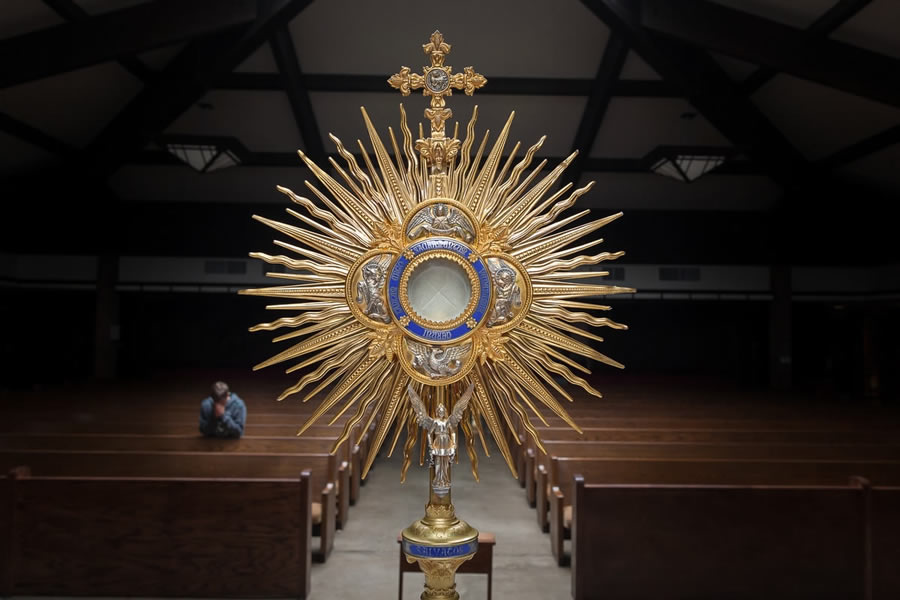
50th Anniversary of Humanae Vitae (Part III of III)
07-29-2018Pastor's LetterFr. Don Kline, V.F.Dear Brothers and Sisters,
Why does the Church say no to contraception? In Msgr. Charles Pope's article entitled: "The "Fruits" of Contraception," we are reminded that Pope Paul VI predicted in Humanae Vitae many of the problems that our culture is facing as a result of using birth control.
Pope Paul VI predicted that the divorce rate would increase as the contraception mentality becomes more acceptable. Divorce rates have continued to rise and are currently around the 40 percent range. Pope Paul VI understood that marriage would suffer because of contraception. He wrote: "Let them first consider how easily this course of action could open wide the way for marital infidelity and a general lowering of moral standards."(HV 17).
READ MORE
50th Anniversary of Humanae Vitae Part II of III
07-22-2018Pastor's LetterFr. Don Kline, V.F.Dear Brothers and Sisters,
In Trent Horn’s book entitled "Why We’re Catholic," he presents a creative view of the contraceptive thinking:
Imagine you are trying to select a wedding date and it’s right around the time your wife’s high school age cousins have a big football game. If you really want them to attend the wedding, you’ll pick the week before their game. But let’s say your budget is tight and you have no more room on your guest list. You might choose to schedule the wedding during their big game and send an invitation anyways as a sign that you still value the relationship. If they show up, it might be a bit stressful, but you’ll still be glad they came.
Now, let’s imagine you don’t want to wait a week and you absolutely don’t want the cousins to come to the wedding. In order to make sure they don’t arrive, you send them a “dis-invitation” that says, “Please don’t come to our wedding, you’re not wanted here!”
So how does the wedding story relate to NFP?
Picking the date that works best for the cousins is like being intimate on a fertile day; you’ve created optimal conditions for children to arrive. Postponing the wedding by a week is like waiting to be intimate on an infertile day. The children probably can’t arrive, but if they do that’s still great!
READ MORE
50th Anniversary of Humanae Vitae: Part I of III
07-15-2018Pastor's LetterFr. Don Kline, V.F.Dear Brothers and Sisters,
Is the Church wrong on contraception?
For many people, sexual pleasure is placed very high on the list of their priorities. Since our culture has basically endorsed this sort of thinking, the Catholic Church’s teaching on contraception can seem old-fashioned or unnatural. Many well-intentioned people argue that the Church’s teaching on being open to life not part of God’s original plan for the marital embrace (conjugal love). It can be difficult for even faithful married Catholics to live as God intends them to live their vocation as husband and wife.
This year marks the fiftieth anniversary of Humanae Vitae, the encyclical affirming the traditional Christian teaching on birth control. As we get closer to the anniversary (July 25th), I thought it might be good to revisit some of the challenges expressed in making this teaching of the Church a lived reality.
In 1968, Pope Paul VI issued his life-centered encyclical letter Humanae Vitae (Latin, "Human Life"), which reemphasized the Church’s constant teaching that it is always intrinsically wrong to use contraception to prevent new human beings from coming into existence.
What is Contraception?

Mass Etiquette: Part III of a III part series
07-08-2018Pastor's LetterFr. Don Kline, V.F.Dear Brothers and Sisters in Christ,
We are blessed with a beautiful parish campus with many distinct areas. The first that is of concern to you are the pews (where you pray) —a sacred space where we journey to God to receive the Eucharist. We need to treat it that way. Keep it clean for others—throw your nasty Kleenex’s and other trash away! Put the books back and the kneelers up for the next Mass. Also, the main body of the church where we celebrate Mass is not a children’s obstacle course or a train station where we visit with friends to catch up on the latest. This is a place for prayer where silence is golden. Thankfully, we are blessed with a spacious Narthex and plaza for fellowship with members of the Body of Christ. Use this space for talking and building friendships. I actually encourage it.
READ MORE
God Bless America!
07-01-2018Pastor's LetterFr. Don Kline, V.F.Dear Brothers and Sisters,
American Saint Frances Cabrini once said, “I will go anywhere and do anything in order to communicate the love of Jesus to those who do not know Him or have forgotten Him.” This seemed to be the conviction of all our American saints who founded hospitals, grade schools, churches, universities, leper colonies, orphanages, missionary outposts, soup kitchens and more. In order to remind others of the goodness of God and Christ’s redeeming, so many saints, canonized or not, functioned as building blocks of our country. Catholics, in other words, have played a huge part in American history.
We celebrate our freedom on the Fourth of July this week! As Catholics, we especially pray for religious liberty on this day. Religious freedom, after all, is one of the primary reasons that people came to America, many fleeing from persecution.
The Church’s focus on religious liberty in recent years is on a general anti-religious cultural movement, rooted in secularism and relativism, which seeks to limit the role of religion in public life. Many politicians today have defined religious freedom only in terms of the “freedom to worship’ within the walls of a church building. But once we leave the building, we are told to hide our faith under a bushel basket.
This was certainly not the intent of our founding fathers. They recognized the essential role of religion and the virtues that faith inspires. Those virtues provide the foundation for the success of a peaceful society. The erosion of our faith and our moral compass is directly related to the erosion of our religious practice.
READ MORE